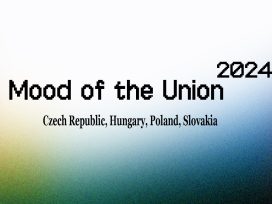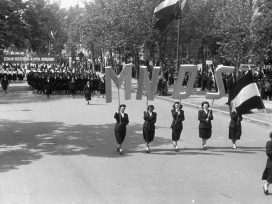András Schweitzer: Before the Hungarian Parliament ratified the Treaty of Trianon in November 1920 lawmakers protested that the pact proclaiming Hungary’s dismemberment was unjust and violated mankind’s common interests. They also complained that the population data on which the treaty was based were incorrect. Hungary lost two thirds of its territory, and three million Hungarians. The parliamentarians appealed “before divine justice to the conscience of mankind.” Collectively they recited the irredentist prayer “I believe in one God, I believe in one homeland…” Don’t you find it astonishing that an international agreement should be ratified under such circumstances?
Miklós Zeidler: Trianon was a momentous international treaty which couldn’t be entrusted solely to diplomatic channels; it needed parliament’s approval to be legally binding – this was true of every signatory state, not only Hungary. The Hungarian constitution requires that a bill first be discussed in committee before being debated in the chamber. The spokesmen for the committees of external, constitutional and economic affairs put forward not a single word in the bill’s favour. Force of necessity compelled them to accept it. By invoking divine power they made clear that Hungary was under coercion while declaring the treaty null and void before a “higher power”. Such gestures were not singular: instead of using the ornamental pen provided at Grand Trianon, for example, one Hungarian delegate maintained he had demonstratively signed with one that was worn out (the ornamental pen, nevertheless, was displayed in the Museum of Military History between the two world wars). To this day the terms ‘peace treaty’ and ‘peace dictate’ have been used interchangeably in Hungarian.
AS: All the same, would it not have been more honourable for the National Assembly to reject the Treaty and for the country to choose passive resistance, or indeed active resistance, as Turkey did under Kemal Atatürk?
MZ:The Hungarian Parliament could look to a variety of models. Trianon was not the first of the treaties to be signed, ratified and put onto the statute book. In Germany too opposition to signing and ratifying the Treaty of Versailles was sizeable. There too a government crisis unfolded and it took months before Parliament finally agreed. The process was speedier in Bulgaria and Austria. The Turks did not even ratify the proposed peace settlement, putting up armed resistance until they managed to win better terms. But no one at the end of 1920 could have foreseen the outcome of the Turkish events, as the diplomatic and military conflicts dragged on for three years. Threats by the Allied powers were ineffective in such a huge country; its capital was far from any armed forces the Allies might have mobilised. Moreover, the newly established USSR came to Turkey’s aid where Allied interventions had failed. Small, landlocked Hungary, on the other hand, could be forced to accept the terms of peace with relative ease. Nothing would have been simpler than to impose an economic blockade, as had been done in spring 1919, at the time of Hungary’s short-lived Communist regime. Back then Hungary had been highly dependent on foreign trade. It had no allies and barely any diplomatic relations – it was literally surrounded by hostile states. At the time the armies of the three Little Entente states were about ten times bigger. The only frontier that could be crossed was the Austrian, but relations with the government of the left in Vienna were far from cordial, and the two countries confronted each other in a dispute over western Hungary. The attempt to stabilize finances in autumn 1920 had failed and bankruptcy threatened. Then again there was the fate of ethnic Hungarians under foreign rule, in many cases losing their livelihood, but who, legally speaking, were still Hungarian citizens. The Treaty of Trianon had provisions regarding their legal status and citizenship, and offered a guarantee that the world generally would recognise Hungary as a new, independent state, one of the successor states of the Austro-Hungarian Empire. (The victorious Great Powers only regulated their diplomatic relations with Hungary on 26 July 1921. With the exchange of the ratification documents the state of war was formally brought to an end.)
AS: The peace treaty was thus signed in the summer of 1920, ratified in November, but it only acquired the force of law at the end of July 1921, after Regent Miklós Horthy signed the document. Why the delay?
There were also arguments within the government. Thus, when the Hungarian government received an invitation to attend the Paris Peace Conference at the beginning of December 1919, Count Albert Apponyi, who had been picked to lead the delegation, tried to delay its departure because he believed that time was working against the Entente, and the Russians would also have a say in how power relations were to develop in Central and Eastern Europe. Miklós Horthy, on the other hand, opposed delay because he felt that Hungary was under an obligation to the Entente, which in mid-November had forced the Romanian forces to withdraw from Budapest, thus assisting the process of normalising the political situation in Hungary. For a time the situation in Europe had been unclear, which some countries – not just Turkey, as mentioned, but also Poland, Romania and Italy – tried to exploit by acquiring ever-newer land. And indeed in Hungary there were those who were ready enough to fish in troubled waters. The end result of all this was that Hungary managed to regain, on the basis of a plebiscite, 100 square miles along the Austrian frontier which lay around Sopron. Alongside that, up until August 1920, the Hungarian government engaged in secret talks with the French to obtain an adjustment of the borders in keeping with ethnic realities. In exchange, the French would have been granted major investment opportunities in Hungary in railways, shipping on the Danube, and also some important financial institutions and industrial enterprises. More valuable still: were Hungary incorporated into their alliance system a barrier would be erected stretching from the North Sea to the Adriatic, i.e. Poland, Czechoslovakia, Romania, Hungary and Yugoslavia, which would have protected France against both Germany and Russia. The Hungarian government therefore did not wish to ratify the Peace Treaty while there was still hope that these negotiations would be successful. Also contributing to the delay was the Hungarian government’s fear of public resistance. The bulk of the members of the National Assembly elected in January 1920 were new to the legislative process, and very few possessed any international political experience, so it was hard to convince them to back Hungary’s dismemberment.
AS: What arguments were deployed by those who opposed signing?
The opposition did not dispute that Hungary had no choice, but they took the line that agreeing to dismembering historical Hungary had no constitutional foundation. The constitutional tradition always declared the continuity of the historical territory of the country, even when it was split three ways at the time of the Turkish occupation of the 16th and 17th centuries. Estate owners, for example, made efforts to collect feudal dues in territories occupied by the Turks and the territories under Habsburg rule regularly. These regions were looked on as inalienable parts of the lands of the Hungarian crown. This school of thought was still alive in 1920. Another argument was that the National Assembly, representing as it did only a small fraction of the total population of historical Hungary, was not entitled to speak on behalf of the whole nation. In fact it was not just that the elections did not cover the whole of historical Hungary, but they did not even cover the whole territory of truncated Hungary. In zones that had been under Czechoslovak, Romanian and Yugoslavian occupation stretching beyond the planned frontier lines elections could only be held after the troops had been withdrawn. Admittedly several representatives for what was to become the Burgenland in Austria (at the time still under Hungarian rule) were returned to the National Assembly, so they had the chance to raise their voices in Parliament to protest against the planned detachment of the territory.
AS: In any event, the vote was unanimous.
When, after much prompting, the Entente finally fixed a deadline for 15 November, the parliamentary parties reached agreement on how they would ratify the treaty smoothly. The way the session was to be conducted was choreographed in advance. It was agreed that those who rejected ratification would speak first and then leave the debating chamber. This also suited Prime Minister Pál Teleki since under those circumstances a unanimous ‘Yes’ vote amounted to a powerful protest, given that the voting would demonstrate the undeniable duress that had been emphasized by earlier speakers. What happened was that forty-some members who voted against ratification threw a spanner in the works! After they had delivered their dissenting speeches they moved over to the adjoining Central Hall where they signed minutes to declare that they were unwilling to contribute to the dismantling of historical Hungary. Then they all sang the national anthem. Meanwhile in the debating chamber Teleki had started his own speech in which, as head of the government, he advised accepting the peace treaty and passing the appropriate bill. At that moment the sound of singing filtered into the chamber: the other representatives joined in and sang the national anthem right through – not a few of them sobbing. As far as I am concerned, this was one of the most harrowing moments in Hungarian history because it demonstrates that at the very moment of collapse, when the supreme requirement would have been for a rallying of forces, not for the first time in Hungarian politics, dissension emerged triumphant. The position of those members who were willing to join with Teleki in making the sacrifice must have been agonizing. The course of action adopted by the protesting representatives was particularly unworthy. They had not only refused to accept responsibility but wanted to show off their moral superiority by formulating their patriotism in a separate document. Teleki gave voice to that on the spot, saying: “I do not consider it to be fair and proper for someone to present the issue in such a way as to suggest that there is one person here who ‘supports’ this bill… there is not one person here, and I include myself, who is ratifying the peace treaty in the belief that it is just in even a single point.” The next day sharp rebukes for the members who had marched out appeared in the press. Teleki, by the way, from 1918 onwards, had done nothing other than defend historical Hungary by every means at his disposal both as a geographer and a politician; there can be no doubt that he had strived this way more than any one of his colleagues. He had played a key role in the preparations for peace; he was one of the senior delegates within the peace delegation; he had been foreign minister at the time the peace settlement was signed; and he was prime minister when it was ratified. For a politician who committed suicide two decades later at seeing his cautious foreign policy collapse and Hungary marching fatefully towards World War II, the speech he delivered during the ratification debate was a tragic station on a personal Calvary at the end of which he tabled a parliamentary motion of censure against himself. It was highly irresponsible of politicians who had no wish to share in this responsibility to present themselves as stouter patriots than he. It was much like a sort of further Trianon – this one being internal, psychological. It was not enough that Hungary had been divided, but there were people who sought to split the Hungarian nation further: into good and bad Hungarians.
AS: Others suffered even more from accusations of being unpatriotic. It is paradoxical that Mihály Károlyi, the first post-war President of the Republic of Hungary, preferred to resign and the Communist Béla Kun took up arms to fight the country’s dismemberment, whereas the Horthy regime, which blamed both of them for Trianon, was forced to sign the Treaty.
That’s right. The leaders of the revolutions were blamed for their lack of patriotism throughout the inter-war period. Yet then, at the time the counterrevolutionary regime assumed power, there was no question of resistance since three quarters of the country was under enemy occupation.
AS: Would the situation have been any different if Károlyi had not been reluctant to fight?
It is important to stress that the pacifism of the Károlyi government did not spring from any impotence or incompetence but from a conviction held by the president himself and his intimates. Károlyi’s pacifism, his pro-Entente sympathies, and the faith he placed in the principles of Wilson’s Fourteen Points were well-known. They were repeatedly proclaimed by him and his supporters in Parliament. It was with this programme, indeed, that Károlyi came to power, and in the autumn of 1918 he was the most popular politician in the country – something his opponents, whether wistfully or despondently, had to admit. During the final days of the Monarchy’s collapse essentially the whole of Hungary’s political elite could see that rapprochement to the Entente was necessary. István Tisza himself said as much in Parliament when he admitted that Hungary had lost the war. Károlyi entered into an armistice in Belgrade on November 13th on the basis of which the foreign forces, Serbian and Romanian, which had begun encroaching on Hungarian territory, would only have been permitted temporarily to occupy about one quarter of the country, and the Hungarian local administration would have stayed in place. Károlyi wished to stick to this agreement, which he deemed favourable from the Hungarian viewpoint, lest he were to forfeit the Entente’s trust before the peace talks. That was both a logical and principled stance, and the only reason it failed was because the Entente could not care a hoot about the Belgrade agreement signed by “their irresponsible general”. Károlyi was a pacifist but also an integrationist. It was the National Commission for Propaganda that he had set up which came up with the slogan “No, no never!” to reject compromise over any loss of territory, but he rejected armed resistance and he carried out repeated Entente demands to evacuate. He only demanded determined resistance from the retreating Székely division when the Romanians had advanced almost as far as Hungary’s present-day frontier. By that time, however, the government had demobilised an army which at the end of the war was still more than 1 million strong. The force of eighty thousand which replaced it was not operational. A recruiting drive started at the beginning of 1919 made very slow progress, and in six weeks only about five thousand men rejoined the army even though there were places where land was offered to those who did.
AS: What would have happened if Károlyi had not allowed the army to disband in the autumn and had not placed his trust in the Entente?
If one supposes that Károlyi were to have dumped a policy which made him popular and which helped to bring him to power, and which he certainly meant to carry out, and if one further supposes that he would have been able to maintain the fighting spirit and reinforcements of a million-strong armed force – though a good half of them were not ethnic Hungarians and that in a situation when supplies had been stalling for months – then there is little doubt that much of the territory could have been preserved. It is pure fantasy, however, to make such a supposition. The ethnic Serb, Croat, Romanian and Slovak soldiers in the Hungarian army were well aware that new states were in the process of being formed on the territory of the Austro-Hungarian Monarchy, so why would they have fought for Hungary in a war that they detested? And even if half the army, i.e. the soldiers who were ethnic Hungarians, could have been retained, provision would have had to be made for the logistics of keeping a military force of half a million men supplied with weaponry, ordnance, rations and clothing. By that stage Hungary was incapable of doing this. In the late autumn and winter months there were shortages of wood and coal; the whole country was freezing, output in the manufacturing industries fell and rail traffic was subject to constant interruptions. Under those circumstances one would not have given the country much of a chance against an army of half a million operating in the Balkans plus the forces that the successor states were gradually arming. But in any case, as I said, that was not Károlyi’s policy: he had attained power on a tide of popular support for his slogan that he would bring the war to an end. It would be more to the point to ask if any other political force existed in Hungary at the tail end of World War I capable of convincing Hungarians that a final push was all that was needed. By the autumn of 1918 not even István Tisza possessed the necessary authority to do that; indeed, by then he was the most hated politician in Hungary. He himself did not believe that he could regain power, and he had been advised by several quarters that plans were afoot to assassinate him. He could have retired from Budapest to his country estate, but he did not. Perhaps his reason for not doing so was because as a Calvinist he believed in predestination. He was assassinated on October 31st, on the day that Károlyi attained power. Károlyi was thus left for months without a potential right-wing opponent. So a considerable number of factors played a part in Hungary’s break-up: alongside historical processes of la longue durée there were was the turmoil of that particular period, the collapse of Hungary’s ability to defend itself, and the impotence of revolutionary governments.
AS: How, in that case, was it possible in the Horthy era to shift the blame for that onto revolutionary governments?
The notion which became dominant in public discourse and in schools essentially “forgot” the inconvenient fact that Hungary, a part of the Austro- Hungarian Empire, was one of the Central Powers which lost World War I. It had been bled white economically, and dissension between the nations that inhabited it had undermined the country’s political unity. This interpretation in essence pinned the blame for the dissolution of historical Hungary on three factors: 1) the erroneous policies of the revolutionary governments; 2) endeavours on the part of ethnic minorities to secede; and 3) mistaken power politics on the part of the victorious western Great Powers. In the public imagination all three factors were lumped together as treachery, thus all those supposed to be responsible were described as morally despicable. The leaders and activists of Hungary’s revolutionary governments could do very little to counter such prevalent views; a fair number of them were obliged to emigrate, and a number of those who remained in Hungary ended up in a court or internment, forced underground, or became victims of the White Terror. During the subsequent consolidation period, and following a relaxation of press censorship, Octobrist and left-wing explanations also won a place in various liberal and Social Democrat publications, but a direct link between the revolutions and Trianon was still left as the overwhelming accepted opinion.
AS: What was the role of the Soviet Republic of Hungary in the peace settlement? Many people reckon that Communist power tuned the Entente even more against Hungary and thereby set the seal on their decision to truncate it. If one applies the same logic differently, though, Hungary might even have benefited from the Entente recognising that every excessive dismemberment of the country invariably led to an extremist government.
As far as the Peace Conference was concerned, Bolshevism was a genuine threat, but it did not play a decisive part in fixing Hungarian borders. By the time the Soviet Republic was proclaimed, expert opinion on proposed frontier changes was already available and it only needed the assent of politicians. It is true that this took place at the time of the Soviet Republic as did the idea to tack on the loss of the Burgenland. Indeed, the political decision on most of Hungary’s frontiers was made in May 1919. The ceding of Western Hungary was agreed on in July 1919. Then again the Peace Conference found it hard to decide how it felt about the Soviet Republic of Hungary. One of Lloyd George’s favourite colleagues, the Prime Minister of South Africa, General Jan Smuts, travelled to Budapest as a “star” diplomat in order to size up the political position and to hold talks about possible modifications to the armistice demarcation lines. After that mission failed the Peace Conference permitted a Romanian advance in Hungary, but it also sent an invitation to the government of the Soviet Republic to attend the Peace Conference. The telegram containing the invitation, however, was not forwarded to Budapest by the Entente’s representative in Vienna, more aware of the danger of Bolshevism, and, in any case, receptive to anti-Bolshevik Hungarian émigrés in Vienna headed by István Bethlen. Then, in June 1919, the Peace Conference sent an ultimatum ordering a halt of the succesful northern offensive action by the Hungarian Red Army, which had started in May. The Hungarians withdrew and this ultimately led to a counter-offensive by the Romanian army and the Romanian occupation of Budapest early in August, putting an end to the Soviet Republic and the Trades Union Government which succeeded it. Hungarian counterrevolutionaries also played their part. It was they who passed the Red Army’s plans for the Tisza offensive to the Romanian High Command and with the assistance of a Romanian army unit arrested the members of the Trades Union administration on August 6th.
AS: How did the Western powers regard the fact that Hungary’s domestic policies set not only the reacquisition of ethnic Magyar territories but the restoration of historical Hungary in its entirety as a goal from the start?
There are some raw facts in politics, and one of these is that Hungary signed the peace treaty and placed it onto the statute book. Compared with that, Hungarian dreams were of minor importance. The report of the U.K. Chargé d’Affaires in Budapest on the ratification debate on 13 November 1920 is typical. It concludes: “I consider the wording of the resolution and the subsequent chauvinistic and fiery speeches of the irredentist members of the Chamber quite natural under the circumstances. It would be too much to expect the National Assembly ‘to kiss the rod’. The main fact remains they have accepted their defeat and its consequences, and if a little eloquence will help them to retain some shred of self-respect, it would be both unchivalrous and unwise to reproach them for a few passionate words uttered from the abyss of their humiliation and the sacrifice of their nation.”
AS: When, earlier, the Hungarian government received the peace terms, a covering letter from the French Prime Minister Alexandre Millerand mooted possible subsequent frontier revisions.
The aim of the letter suggested by the British was to sugar the pill for the Hungarians. Even though Albert Apponyi, who headed the Hungarian delegation, immediately declared that this covering letter held out hope for a revision, Hungarian diplomats recognised that the letter placed no binding obligation on the Entente as it anyway entrusted possible border adjustments to bilateral talks between the countries on specific stretches of the border. The victorious Powers on more than one occasion made it crystal clear to Hungarian diplomats that the Millerand letter could not be used as the starting point for wholesale frontier revisions. However, Hungarian revisionists continued to refer to it as being a document which tacitly recognised that the peace dictate had been unjust.






